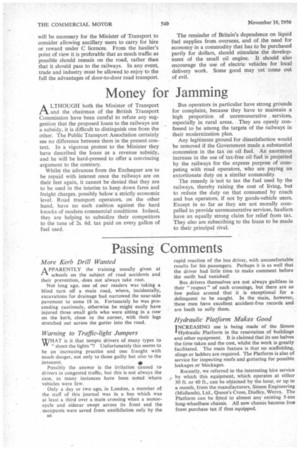Money for Jamming
Page 40

If you've noticed an error in this article please click here to report it so we can fix it.
ALTHOUGH both the Minister of Transport and the chairman of the British Transport Commission have been careful to refute any suggestion that the proposed loans to the railways are a subsidy, it is difficult to distinguish one from the other. The Public Transport Association certainly see no difference between them in the present context. In a vigorous protest to the Minister they have described the loans as a revenue subsidy, and he will be hard-pressed to offer a convincing argument to the contrary.
Whilst the advances from the Exchequer are to be repaid with interest once the railways are on their feet again, it cannot be denied that they are to be used in the interim to keep down fares and freight charges, possibly below a strictly economic level. Road transport operators, on the other hand, have no such cushion against the hard knocks of modern commercial conditions. Indeed, they are helping to subsidize their competitors to the tune of 2s. 6d. tax paid on every gallon of fuel used. Bus operators in particular have strong grounds for complaint, because they have to maintain a high proportion of unremunerative services, especially in rural areas. They are openly confessed to be among the targets of the railways in their modernization plan.
Any legitimate ground for dissatisfaction would be removed if the Government made a substantial concession in the tax on oil fuel. An enormous increase in the use of tax-free oil fuel is projected by the railways for the express purpose of competing with road operators, who are paying an extortionate duty on a similar commodity.
The remedy is not to tax the fuel used by the railways, thereby raising the cost of living, but to reduce the duty on that consumed by coach and bus operators, if not by goods-vehicle users. Except in so far as they are not morally compelled to provide unremunerative services, hauliers have an equally strong claim for relief from tax. They also are subscribing to the loans to be made to their principal rival.




















































































































